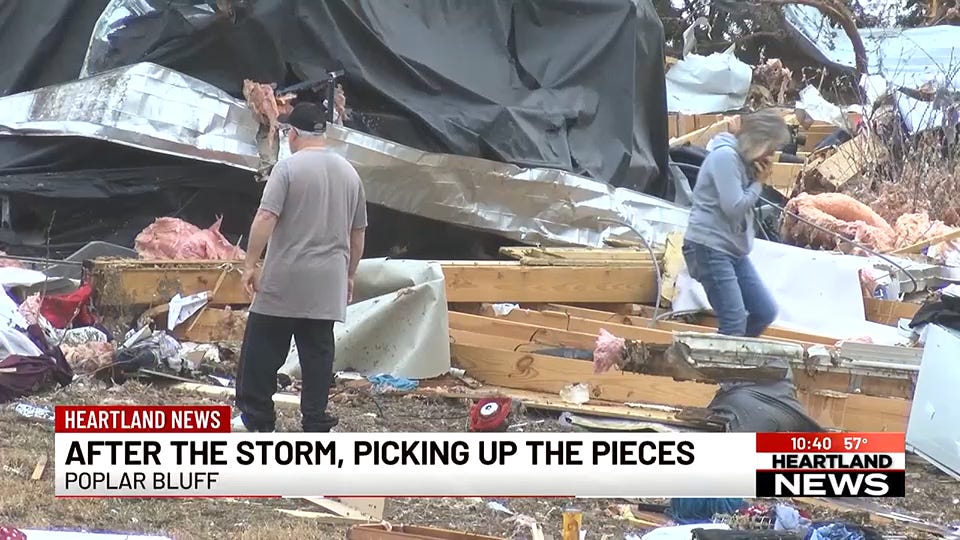In Missouri this weekend, Christopher Mattox gripped his mattress as his mobile home lifted inches off the ground in a tornado's grasp. As he later surveyed the wreckage with his wife, one question dominated his thoughts: "Where am I going to live?" His story, like dozens of others across the Midwest and South, reflects an uncomfortable truth: there are two storms ravaging America. The first – the physical catastrophe that killed at least 40 people across several states – arrived with wind and fire. The second storm, less visible but equally as destructive, lies in how we've structured who bears the burden of these increasingly frequent disasters.
Storm Damage as Corporate Debt
Imagine the absurdity of someone smashing your home and then handing you the bill. This is precisely what's happening right now. Families in Missouri are left homeless; retirees in Oklahoma are sifting through ashes to salvage memories; drivers in Kansas faced deadly pile-ups amidst sudden, blinding dust storms. And who pays? Not the oil executives who knew this was coming, not their scientist who predicted it, not the companies who've profited from pollution – but everyday Americans who are already stretched thin.
This storm of injustice isn't inevitable. Climate superfund legislation, already signed into law in states like Vermont and New York – and recently introduced in storm-battered Tennessee as the Climate Resiliency Fund Act – flips this script. It asserts a straightforward moral and economic principle: those who knowingly created the crisis should pay to clean it up. It’s time we treated storm damage not as an inevitable tragedy, but as a corporate debt overdue for collection.
Shifting the Burden Back to Big Oil
Right now, Americans shoulder 100% of climate-related costs through higher taxes, spiraling insurance premiums, medical bills, and personal tragedy. Fossil fuel companies, meanwhile, continue to report enormous profits — ExxonMobil alone raked in over $55,000 per minute in the last quarter of 2024.
Climate superfund bills, being introduced across the nation, require the largest polluters to pay their fair share toward recovery and resilience. These laws follow a common-sense, tested model: the same kind that makes chemical corporations responsible for cleaning toxic spills. Polluters who broke our climate must help repair it.
Changing the Conversation: The Cost of Doing Nothing
Instead of repeatedly asking how we’ll pay for climate damage, let's pivot the conversation: what’s the cost of allowing fossil fuel corporations to continue business as usual? The status quo isn't affordable, ethical, or sustainable. Every dollar spent on disaster recovery today without polluter accountability is money stolen from future investments in schools, healthcare, roads, and job creation.
Practical Steps Toward Climate Justice: How to Talk about Making Polluters Pay
The conversation about making polluters pay isn't about anger or retribution – it's about practicality and fairness. Drew Boers, a 75-year-old who lost his home in Stillwater, Oklahoma this weekend, remarked to the Washington Post: "You can replace furniture. But what we lost that we can't replace are my high school yearbook and photo albums that are from the predigital age because they're printed pictures."
Some losses can't be measured in dollars. But accountability like climate superfund legislation can at least provide communities with the resources they need to rebuild stronger and prepare for future disasters. Here’s how to reframe this conversation effectively:
Name the Debt Clearly:
"When storms devastate communities, taxpayers shouldn't foot the bill. Big Oil knowingly profited from the pollution that drives extreme weather; they owe the American people the cost of recovery."
Draw Clear Connections:
"This weekend’s deadly storms aren't just natural disasters – they’re corporate disasters. It’s not fair for communities to lose everything while fossil fuel CEOs cash checks."
"Burning fossil fuels increases greenhouse gases, intensifying storms, heat waves, and wildfires. Big Oil’s pollution has directly made these extreme weather events more frequent, intense, and devastating."
Cut Through Industry Spin:
"Big Oil says accountability means higher prices—that’s a lie. Fossil fuel corporations earn billions in record profits each quarter, easily exceeding potential superfund costs. Their CEOs earn tens of millions of dollars annually. It’s entirely reasonable – and affordable – for them to clean up the crisis they created."
Our choice is simple: continue subsidizing the destruction of our communities or demand justice, fairness, and responsibility. Let's not just rebuild what we've lost – let’s rebuild a system that finally works for everyone.
Learn more about the Make Polluters Pay campaign on our website and Instagram. Join us!


